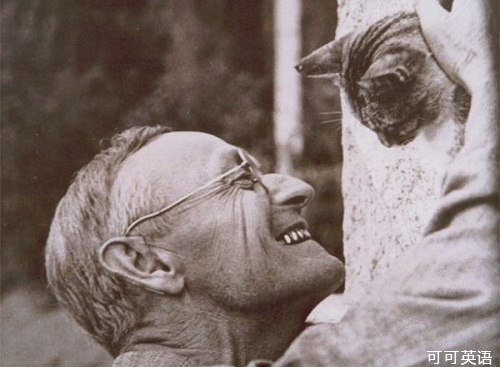(单词翻译:单击)
名著阅读
Behold, then Govinda, the shy one, also stepped forward and spoke: "I also take my refuge in the exalted one and his teachings," and he asked to accepted into the community ofhis disciples and was accepted.
Right afterwards, when the Buddha had retired for the night, Govinda turned to Siddhartha and spoke eagerly: "Siddhartha, it is not my place to scold you. We have both heard theexalted one, be have both perceived the teachings. Govinda has heard the teachings, he has taken refuge in it. But you, my honoured friend, don't you also want to walk the pathof salvation? Would you want to hesitate, do you want to wait any longer?"
Siddhartha awakened as if he had been asleep, when he heard Govinda's words. For a long tome, he looked into Govinda's face. Then he spoke quietly, in a voice without mockery:"Govinda, my friend, now you have taken this step, now you have chosen this path. Always, oh Govinda, you've been my friend, you've always walked one step behind me. Often Ihave thought: Won't Govinda for once also take a step by himself, without me, out of his own soul? Behold, now you've turned into a man and are choosing your path for yourself.I wish that you would go it up to its end, oh my friend, that you shall find salvation!"
Govinda, not completely understanding it yet, repeated his question in an impatient tone: "Speak up, I beg you, my dear! Tell me, since it could not be any other way, that youalso, my learned friend, will take your refuge with the exalted Buddha!"
Siddhartha placed his hand on Govinda's shoulder: "You failed to hear my good wish for you, oh Govinda. I'm repeating it: I wish that you would go this path up to its end, thatyou shall find salvation!"
In this moment, Govinda realized that his friend had left him, and he started to weep.
"Siddhartha!" he exclaimed lamentingly.
Siddhartha kindly spoke to him: "Don't forget, Govinda, that you are now one of the Samanas of the Buddha! You have renounced your home and your parents, renounced your birthand possessions, renounced your free will, renounced all friendship. This is what the teachings require, this is what the exalted one wants. This is what you wanted foryourself. Tomorrow, oh Govinda, I'll leave you."
For a long time, the friends continued walking in the grove; for a long time, they lay there and found no sleep. And over and over again, Govinda urged his friend, he shouldtell him why he would not want to seek refuge in Gotama's teachings, what fault he would find in these teachings. But Siddhartha turned him away every time and said: "Becontent, Govinda! Very good are the teachings of the exalted one, how could I find a fault in them?"
Very early in the morning, a follower of Buddha, one of his oldest monks, went through the garden and called all those to him who had as novices taken their refuge in theteachings, to dress them up in the yellow robe and to instruct them in the first teachings and duties of their position. Then Govinda broke loose, embraced once again hischildhood friend and left with the novices.
But Siddhartha walked through the grove, lost in thought.
Then he happened to meet Gotama, the exalted one, and when he greeted him with respect and the Buddha's glance was so full of kindness and calm, the young man summoned hiscourage and asked the venerable one for the permission to talk to him. Silently the exalted one nodded his approval.
Quoth Siddhartha: "Yesterday, oh exalted one, I had been privileged to hear your wondrous teachings. Together with my friend, I had come from afar, to hear your teachings. Andnow my friend is going to stay with your people, he has taken his refuge with you. But I will again start on my pilgrimage."
"As you please," the venerable one spoke politely.
"Too bold is my speech," Siddhartha continued, "but I do not want to leave the exalted one without having honestly told him my thoughts. Does it please the venerable one tolisten to me for one moment longer?"
Silently, the Buddha nodded his approval.
瞧,腼腆的戈文达这时也走上去说:“我也愿意信奉您和您的学说。”戈文达请求成为活佛的弟子,结果也被接纳了。
接着,活佛退下去就寝,戈文达转向席特哈尔塔,热诚地说道:“席特哈尔塔,我没有权利责怪你。可是,咱们俩都听了活佛讲经,都听了他的教诲。戈文达听了教诲后已经信奉了活佛。可是你呢,我尊敬的人,难道你就不想走这条获救之路?难道你还犹豫,还要等待?”
席特哈尔塔听了戈文达的话如梦方醒。他久久地凝视戈文达的脸,然后低声说道,语气中毫无讽刺的意味:“戈文达,我的朋友,现在你迈出了第一步,你选择了这条路。哦,戈文达,你向来都是我的朋友,一直是紧跟着我。我常想:没有我,戈文达会不会有一天也出于自己的意愿而单独迈出一步呢?瞧,现在你成了男子汉,自己选择了自己的道路。但愿你能把这条路走到底,哦,我的朋友!但愿你能获救!”
戈文达没有完全听明白,于是又用不耐烦的口气重复了他的提问:“你倒是说呀,我求求你,亲爱的朋友!告诉我,怎么就不能是另一种样子,你,我的博学的朋友,也信奉这位可敬的活佛呢?”
席特哈尔塔把手放在戈文达户上说:“你没听清我的祝愿,戈文达。我再重复一遍,但愿你能把这条路走到底!但愿你获救!”
这是戈文达才明白,他的朋友要离开他了,便哭起来。
“席特哈尔塔!”他抱怨地喊道。
席特哈尔塔温和地说:“别忘了,戈文达,你现在已经是皈依佛祖的沙门了!你抛弃了故乡和父母,抛弃了出身和财产,抛弃了自己的意志,抛弃了友情。信仰要求这样,活佛要求这样,你自己也愿意这样。明天,哦,戈文达,我就要离开你了。”
这两个朋友又在小树林里溜达了很久,躺下之后也仍然久久未能入眠。戈文达再三追问他的朋友,要他说清楚为什么不愿信奉戈塔马的学说,他在这一学说中到底发现了什么缺陷。但是,席特哈尔塔每次都回答说:“算了吧,戈文达!活佛的教诲出类拔萃,我怎么能发现缺陷呢!”
第二天清早,活佛的一个弟子,一个年长的和尚,跑遍了林苑各处,把所有新皈依的门徒都叫到他身边,让他们穿上黄僧衣,并且给他们讲解初步的知识,以及与他们的身份相应的职责。戈文达这时又跑回来,再一次拥抱了自己的好友,然后便加入了新和尚的行列。
席特哈尔塔却沉思着漫步走出了林苑。
这时,戈塔马刚巧跟他迎面相遇。他满怀敬畏地向活佛问好,见活佛的目光满含仁慈与安详,就鼓起勇气请求活佛跟他谈一谈。活佛默默地点头同意了。
席特哈尔塔说:“活佛,昨天我有幸听了你奇妙的讲演。我和我的朋友从远方赶来,就是要来听你讲经的。如今我的朋友已留在了你身边,皈依了你,而我却要重新开始我的旅程了。”
“随你便啊。”活佛彬彬有礼地说。
“我的话也许太狂妄,”席特哈尔塔继续说道,“但是,在把我的想法坦诚地告诉活佛之前,我不想离开。活佛,你能不能再劳神听我讲一会儿呢?”
活佛默默地点头同意了。
背景阅读

本书简介:
古印度贵族青年悉达多英俊聪慧,拥有人们羡慕的一切。为了追求心灵的安宁,他孤身一人展开了求道之旅。他在舍卫城聆听佛陀乔答摩宣讲教义,在繁华的大城中结识了名妓伽摩拉,并成为一名富商。心灵与肉体的享受达到顶峰,却让他对自己厌倦、鄙弃到极点。在与伽摩拉最后一次欢爱之后,他抛弃了自己所有世俗的一切,来到那河边,想结束自己的生命。在那最绝望的一刹那,他突然听到了生命之河永恒的声音……经过几乎一生的追求,悉达多终于体验到万事万物的圆融统一,所有生命的不可摧毁的本性,并最终将自我融入了瞬间的永恒之中。
作者简介:
赫尔曼·黑塞(Hermann Hesse,1877.7.2-1962.8.9)德国作家。1923年46岁入瑞士籍。1946年获诺贝尔文学奖。1962年于瑞士家中去世。爱好音乐与绘画,是一位漂泊、孤独、隐逸的诗人。黑塞的诗有很多充满了浪漫气息,从他的最初诗集《浪漫之歌》的书名,也可以看出他深受德国浪漫主义诗人的影响,以致后来被人称为“德国浪漫派最后的一个骑士”。主要作品有《彼得·卡门青》、《荒原狼》、《东方之行》、《玻璃球游戏》等。
主要生平及创作
出生于德国西南部的小城卡尔夫的一个牧师家庭。自幼在浓重的宗教气氛中长大,1891年,他通过“邦试”,考入毛尔布隆神学校。由于不堪忍受经院教育的摧残,半年后逃离学校。这期间他游历许多城市,从事过多种职业。
在比较广泛地接受东西方文化熏陶之后,1904年,黑塞发表了长篇小说《彼得·卡门青特》,一举成名,从此成为专业作家。这一年他与玛丽结婚,移居巴登湖畔,埋头写作,1906年发表了长篇小说《在轮下》。这一时期的创作以浪漫主义诗歌、田园诗风格的抒情小说和流浪汉小说为主,作品洋溢着对童年和乡土的思念之情,充满对广大自然和人类的爱,同时也表现了青年人的精神苦闷与追求。
第一次世界大战后,黑塞的创作发生了明显的变化,他醉心于尼采哲学,求助于印度佛教和中国的老庄哲学,并对荣格的精神分析产生了深厚的兴趣。他试图从宗教、哲学和心理学方面探索人类精神解放的途径。这时期的长篇小说有《克努尔普》(1916)、《德米安》(1919)、《席特哈尔塔》(1922)、《荒原狼》(1927)和《纳尔齐斯与歌尔德蒙》(1930)等。这些书深受西方读者的喜爱,得到极高的评价,其中《荒原狼》曾轰动欧美,被托马斯·曼誉为德国的《尤利西斯》。
30年代后,法西斯在德国猖獗,黑塞对社会前途陷入深深的怀疑与绝望之中,但他仍不倦地从东西方宗教与哲学中寻求理想世界,《东方之行》(1932)、《玻璃球游戏》(1943)正是这一时期追求与探索的结晶。
黑塞被雨果·巴尔称为德国浪漫派最后一位骑士,这说明他在艺术上深受浪漫主义诗歌的影响。他热爱大自然,厌倦都市文明,作品多采用象征手法,文笔优美细腻;由于受精神分析影响,他的作品着重在精神领域里进行挖掘探索,无畏而诚实地剖析内心,因此他的小说具有心理的深度。1946年,"由于他的富于灵感的作品具有遒劲的气势和洞察力,也为崇高的人道主义理想和高尚风格提供一个范例",黑塞获诺贝尔文学奖。


